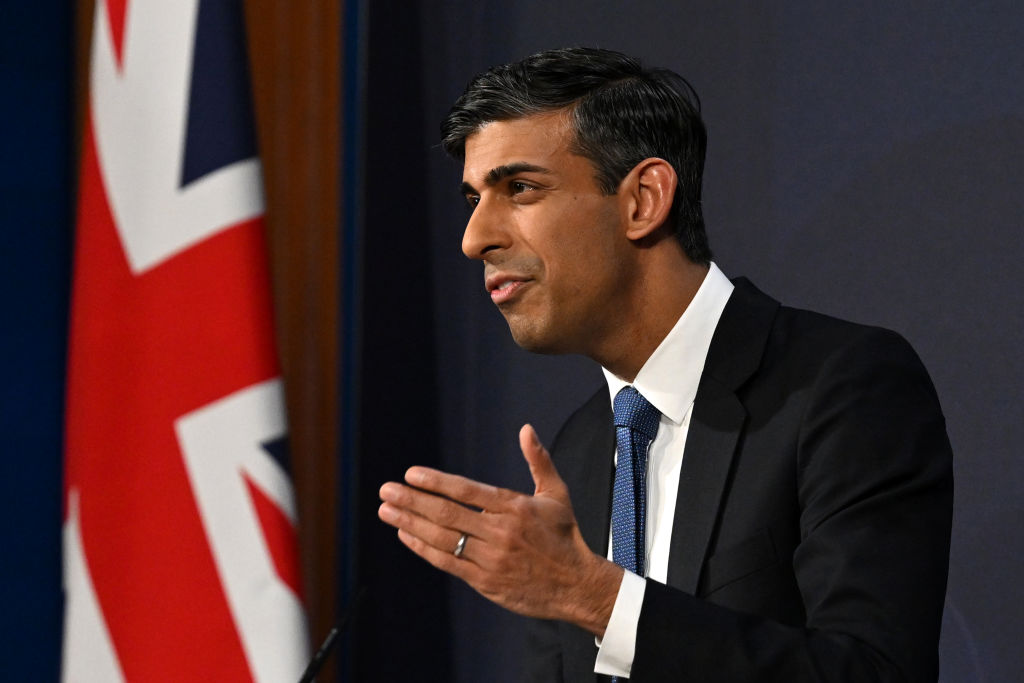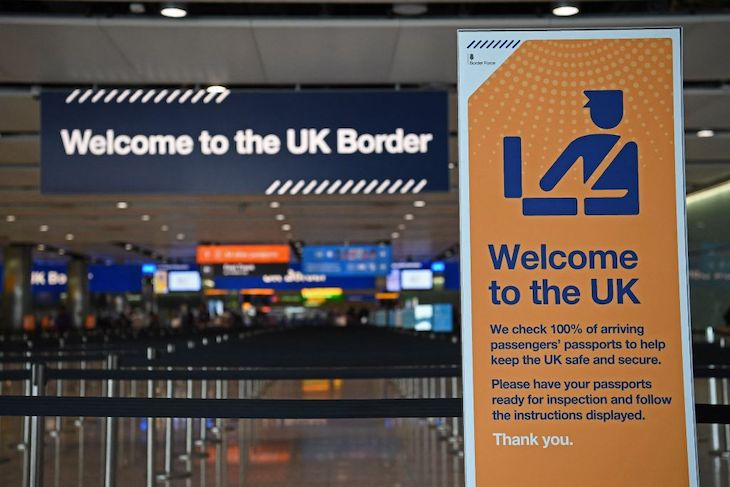Sometimes, what matters in politics is how one issue merges with another to produce an explosive reaction. In the 2010s, it was the fusion of immigration with the European Union which collided to pave the way for Nigel Farage, Brexit, and then Boris Johnson, dramatically expanding the amount of space for these populist revolts. But what about the years ahead? The 2020s and the 2030s will likely see immigration become steadily linked with a very different issue – housing – in a way that will produce a similarly explosive result. The blunt reality is that millions of ordinary people up and down Britain are utterly fed-up with how immigration is driving up house prices, rents and flooding social housing.
This is best symbolised by the fact that about half of all social housing in London now goes to households that are headed by somebody who was not even born in Britain. When I made that point during a GB News debate this week, there was a predictable outburst of outrage. Much of this came from those on social media whose luxury beliefs lead them to simultaneously demand more immigration while knowing full well they are the least likely to feel its effects on the housing market. But I stand by what I said.
Record immigration has not only been driving up house prices
The fact that mass immigration is worsening our housing crisis should not be a controversial point. In fact, it’s common sense. And anybody who has actually bothered to look at the evidence knows this full well. Take these remarkable statistics:
Last year, we built 171,000 houses in England and 204,000 in Britain. This is well short of the government’s official target of 300,000 homes. But that target is based on the assumption that Britain is running a net migration rate of around 170,000 each year: something it’s not done for more than a decade. Instead, in 2022, Britain had a net migration rate of 745,000. This means that Britain actually needs to build at least 515,000 new homes each year, more than half of which are needed just to keep up with the extra demand because of immigration.
In England, to put this in context, it means that last year we only built around one-third of the homes that we now need to build because of immigration. We should be able to talk about this openly. We should be able to talk about how immigration is fuelling the housing crisis, driving up house prices and making many homes unaffordable for British families and British workers.
Don’t believe me? Here’s what researchers at the University of Oxford recently said:
‘ … there is some evidence that migration is likely to have increased house prices in the UK. For example, the Migration Advisory Committee (2018) found that a 1-percentage point increase in the UK’s population due to migration increased house prices by 1% … Their finding was broadly consistent with other modelling by the former MHCLG (2018) and the Office for Budget Responsibility (Auterson, 2014).’
In fact, there’s more evidence than people like to think. In Spain, for example, a recent study found that a 1-point increase in the rate of immigration increases average house sale prices by 3.3 per cent (as did this one). And, while in Britain, one (older) study suggested immigration lowers house prices, this was only because more affluent locals ended up selling their homes and leaving their communities altogether, no doubt alarmed at what was unfolding.
Record immigration has not only been driving up house prices; it’s also been pushing up rents in the private rental market, something that becomes immediately obvious to anybody who has had to attend a viewing with some two dozen other applicants.
The fact that, in 2022, net migration is estimated to have added at least half a million people to England’s already absurd rental market is something most pro-immigration lobbyists, MPs, academics, and columnists, who usually live in their own homes, made possible by privileged parents, are unlikely to ever encounter.
According to Oxford’s Migration Observatory, while only 14 per cent of UK-born people are in the private rental market, this figure surges to 37 per cent among the foreign-born and then, remarkably, to almost 75 per cent among recent immigrants. In London, too, foreign-born people are more than twice as likely to be in the private rental market.

It is this mass immigration which partly helps to explain why 2023 saw the sharpest year-on-year increase in average rents since records began, in 2006. Immigration increased private rents by as much as 7 per cent, according to recent research. It also fuelled demand for another 205,000 rental homes, underlining the growing pressures and how many of us are now stuck in a never-ending doom loop with no end in sight.
Mass immigration is also piling enormous pressure on Britain’s social housing sector, which used to be reserved for impoverished British nationals who had been paying into the collective pot for years and who had long roots in their local communities.
Today, however, things are very different. Nationally, as the Migration Observatory points out, between 2019 and 2021, 16 per cent of UK-born people were living in social housing compared to 17 per cent of the foreign-born. That figure then climbs to 19 per cent among people born in Pakistan or elsewhere in South Asia, and then to a striking 30 per cent among the rising number of typically low-skilled migrants who were born in sub-Saharan Africa, many of whom have also been shown to be a net fiscal cost, rather than benefit, to the British economy.
In London, almost half of social housing is occupied by households that are headed by somebody who wasn’t born in Britain
In London, almost half (48 per cent) of all social housing is now occupied by households that are headed by somebody who was not born in Britain. The most common households are headed by somebody who was born in Africa (18.4 per cent), the Middle East and Asia (11.7 per cent), or elsewhere in Europe (8.7 per cent).
Some of the other statistics are also completely mind-boggling. Like the fact that, in London, 74 per cent of all Somali households are in social housing. As are almost half of all households headed by people from Jamaica or Ghana, 44 per cent from Bangladesh, 42 per cent from North Africa, 41 per cent from Nigeria, 37 per cent from Turkey, 35 per cent from Afghanistan, and 28 per cent from Zimbabwe, compared to 23.5 per cent of the UK-born.
In the likes of Ealing and Haringey, close to 60 per cent of social housing is occupied by households that are headed by people born overseas, while in areas like Westminster and Brent it is at least 60 per cent, if not higher. And contrary to the popular claim that many of these people are born and bred Brits who have been paying into the collective pot for decades, have long roots in their communities, or belong to the ‘Windrush Generation’, this is simply not true.
University professors on social media might wail that their parents arrived in Britain 50 years ago and are just as British as everybody else – which is true – but these are not the people who are disproportionately more likely to be living in social housing, often in highly desirable areas that young Brits cannot afford. A substantial share of social housing is occupied by households headed by people who simply were not in Britain twenty or thirty years ago, but who have, nonetheless, been given social housing in some of the most well-connected, vibrant and culturally enriching parts of Britain, and at the expense of others.
The social housing occupancy rates of recent arrivals to Britain, for example, are a substantial 32 per cent in London, 25 per cent in Birmingham, 26 per cent in Manchester, and 30 per cent in Leicester. Longstanding British nationals, who have lived in the country for decades and have passed through the system – and who, along with their families, have contributed to the collective pot – are now finding themselves pushed out.
All of which raises a number of important questions that you would ordinarily expect to be addressed and answered by our political leaders: Why are so many young British people, workers, and their families forced to pay half their monthly income if not more to live out in the periphery, in places like London’s Zone 4 or beyond, sitting on expensive, packed and dirty commuter trains while wondering why they and other Brits are having to subsidise newcomers, who are frequently economically inactive?
If the policy of mass immigration, supported by both left and right, is so beneficial to Britain, as its leading advocates routinely claim it is, then why exactly is Britain importing so many low-skilled, high-need people from places like sub-Saharan Africa and the Middle East who are disproportionately more likely than the UK-born to be placed in social housing and to be a net fiscal cost to the economy?
And, lastly, if we are serious about wanting to build a more united, cohesive, and successful country then is it not time to recognise that we need to face this crisis head-on? That we need to start by lowering the overall level of immigration into Britain, building more homes, and reshaping our laws so that the people who have contributed most to our society over many years are the ones who are prioritised when distributing these homes and scarce resources like social housing?
It’s not irresponsible or inflammatory to point this out: it’s just common sense. And I suspect many other people out there feel the same way.
A version of this article originally appeared on Matthew Goodwin’s Substack
This article is free to read
To unlock more articles, subscribe to get 3 months of unlimited access for just £3






Comments
Join the debate for just $5 for 3 months
Be part of the conversation with other Spectator readers by getting your first three months for $5.
UNLOCK ACCESS Just $5 for 3 monthsAlready a subscriber? Log in